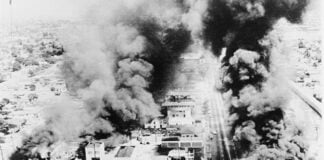Precious
Directed by Lee Daniels, In cinemas now
Watching Precious is a harrowing experience. Director Lee Daniels milks every dramatic movement of Sapphire’s novel Push in bringing Clarieece “Precious” Jones to the big screen. Precious (Gabourey Sidibe) is a product of the ghettos of Harlem circa 1987—poor, overweight, abused and illiterate—her life is rough.
With a celebrity cast and an endorsement from Oprah, Precious has gained more attention than many expected. However, much to the chagrin of mainstream commentators, Sapphire and Daniels refuse to manufacture a happy ending.
The film follows Precious as she is kicked out of high school, unable to read at sixteen and pregnant to her father for the second time. She begins to attend an alternative school where she meets Ms Rain (Paula Patton), the first adult to take a real interest in her wellbeing. It is here that Precious learns to read and write—and to question the basis of her hardships.
Precious is a product of her circumstances—failed by a stressed public schooling system, the subject of racism and sexism and, most noticeably, the poorest of the poor. Daniels, bringing to life a vibrant supporting cast at school with Precious, shows that it is class (not “intelligence”) that is the determining factor in literacy.
The only downside to an otherwise powerful film is the portrayal of what we know is a fraught welfare system in the United States.
Daniels romanticises the welfare available to Precious. The reality is most people do not have access to a small, caring alternative school and a proactive case officer.
On the other hand, Daniels asks us to judge Mary (Precious’s mother, played by Mo’Nique) for her reliance on welfare, rather than asking the real question—why is there not enough welfare money to allow Mary, Precious and the rest of the family to live comfortably and access education?
Daniels’s apparent lack of sympathy for Mary is disappointing, considering her violent outbursts are a result of the same poverty and abuse that has characterised Precious’s life.
Precious is a must-see film. It is difficult to watch, but only because it reminds us that life is difficult to live. It is refreshing to see the realities of poverty and racism on the big screen.
It is Precious’s determination to fight back, not a fairytale ending, that leaves you with a real sense of hope.
By Ernest Price





